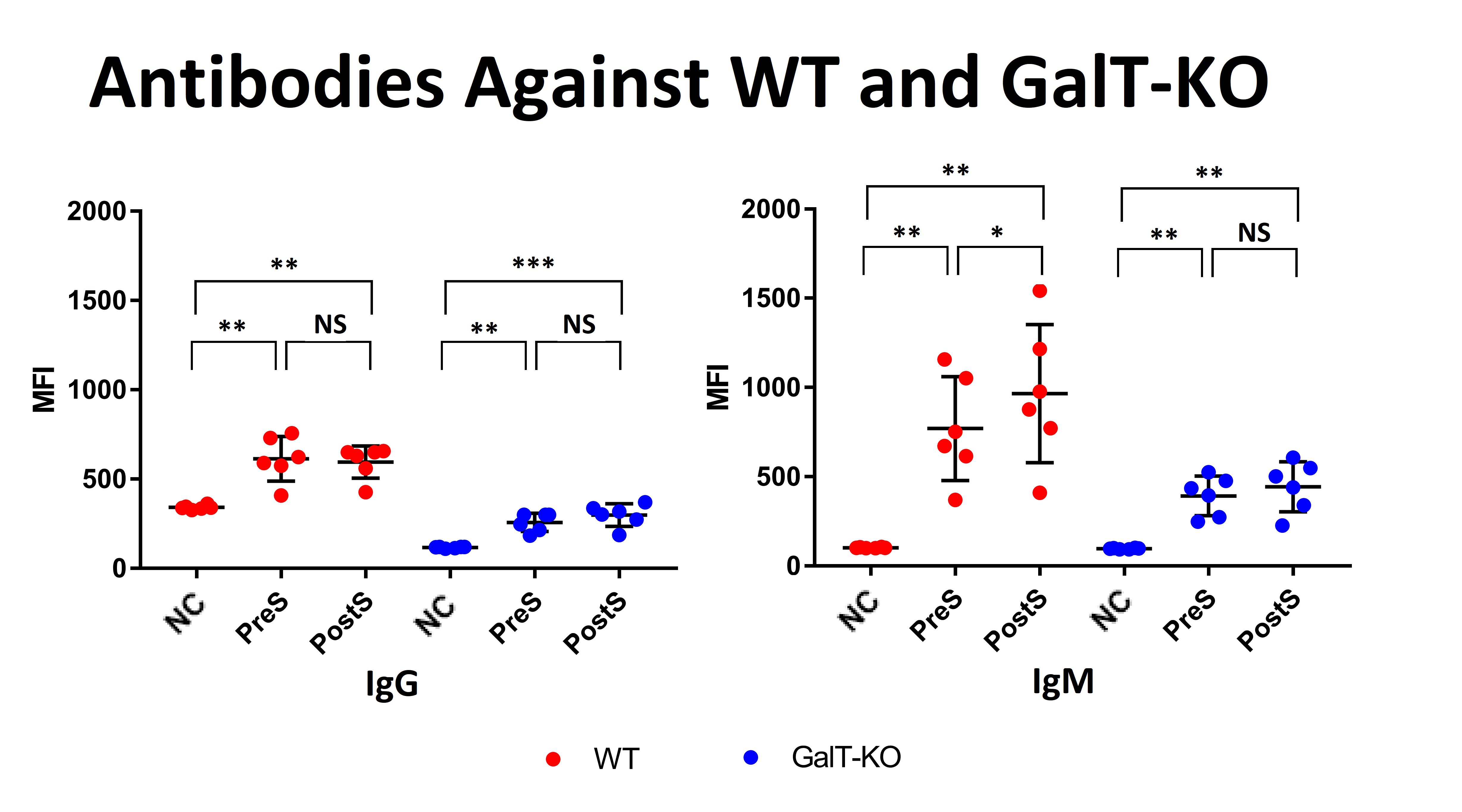α -1,3-galactosyltransferase Knockout Porcine Tissue And Organ May Reduce The Risks Of Antibody Mediated Rejection Via Less Rhesus Igm Cross-reactivity.
Duke Transplant Center, Durham, NC
Meeting: 2019 American Transplant Congress
Abstract number: D82
Keywords: Alloantibodies, Flowcytometry crossmatching, Sensitization, Xenoreactive antibodies
Session Information
Session Name: Poster Session D: Xenotransplantation
Session Type: Poster Session
Date: Tuesday, June 4, 2019
Session Time: 6:00pm-7:00pm
 Presentation Time: 6:00pm-7:00pm
Presentation Time: 6:00pm-7:00pm
Location: Hall C & D
*Purpose: Previously, we observed that sera from rhesus macaques contained preformed antibodies against wild type (WT) swine splenocytes. In the context of xenotransplantation, preformed xenoantibodies can elicit rapid antibody-mediated rejection (AMR). Galactose-α1,3-galactose (Gal), which is made by a-1,3-galactosyltransferase (GalT), is one of the major epitopes to which rhesus and human natural antibodies bind. Studies have shown less human antibody binding to GalT knockout (GalT-KO) pig cells compared to WT pig cells. In this study, we evaluated whether GalT deficiency of target cells would reduce binding of xeno-reactive antibody derived from allo-sensitized rhesus monkeys.
*Methods: In our sensitization model, pairs of rhesus macaques receive two subsequent skin transplants from each other to induce allosensitization. We used the rhesus serum samples from the pre-sensitization time point (PreS) and post-sensitization time point (PostS), and we measured xenoreactive antibodies with T-and B-cell flow crossmatches against WT and GalT-KO splenocytes. As negative controls (NC), splenocytes were also prepared for flow crossmatch without adding any serum.
*Results: Compared to the NC, PreS showed increased antibodies against both WT and GalT-KO (Figure 1). While there is no significant increase in IgG against WT after sensitization (PreS vs PostS), IgM levels against WT increased significantly after sensitization. On the other hand, the levels of IgG and IgM against GalT-KO showed no difference after sensitization.
*Conclusions: Rhesus sera contained pre-formed antibodies against GalT-KO, which implies a humoral immune barrier to xenotransplantation between rhesus and swine. We show that preformed rhesus antibodies against swine formerly observed with WT swine splenocytes were not just Gal-specific, but reactive against other undefined xenoantigens. Allosensitization increases IgM against WT significantly, but not against GalT-KO. This implies that compared to WT organs, xenotransplantation of GalT-KO organs to primates is associated with less risk of AMR in highly allosensitized recipients.
To cite this abstract in AMA style:
Yoon J, Ezekian B, Manook M, Kwun J, Knechtle S. α -1,3-galactosyltransferase Knockout Porcine Tissue And Organ May Reduce The Risks Of Antibody Mediated Rejection Via Less Rhesus Igm Cross-reactivity. [abstract]. Am J Transplant. 2019; 19 (suppl 3). https://atcmeetingabstracts.com/abstract/%ce%b1-13-galactosyltransferase-knockout-porcine-tissue-and-organ-may-reduce-the-risks-of-antibody-mediated-rejection-via-less-rhesus-igm-cross-reactivity/. Accessed February 26, 2026.« Back to 2019 American Transplant Congress

